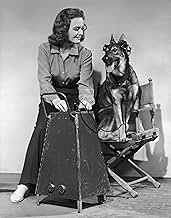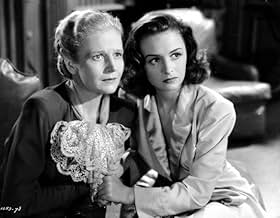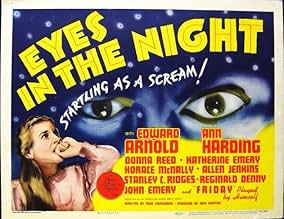VALUTAZIONE IMDb
6,7/10
2119
LA TUA VALUTAZIONE
Un detective cieco e il suo cane indagano su un omicidio e scoprono un complotto nazista.Un detective cieco e il suo cane indagano su un omicidio e scoprono un complotto nazista.Un detective cieco e il suo cane indagano su un omicidio e scoprono un complotto nazista.
- Regia
- Sceneggiatura
- Star
Stephen McNally
- Gabriel Hoffman
- (as Horace McNally)
Stanley Ridges
- Hansen
- (as Stanley C. Ridges)
Rosemary DeCamp
- Vera Hoffman
- (as Rosemary de Camp)
Steven Geray
- Anderson
- (as Steve Geray)
John Butler
- Taxicab Driver
- (non citato nei titoli originali)
Edward Kilroy
- Pilot
- (non citato nei titoli originali)
Recensioni in evidenza
Edward Arnold plays blind detective Duncan Maclain in "Eyes in the Night," a 1942 MGM film directed by Fred Zinnemann that has a lot of other familiar faces.
Ann Harding made her return to the screen after a few years in this small film, playing the stepmother, Norma Lawry, of a young actress, Barbara (Donna Reed at 21), who's fallen in love with an older actor with whom Harding was once involved.
Norma wants Mac to help her convince the actor it's best to steer clear of Barbara. Norma's husband is in Washington presenting a formula to the government that is critical to the war effort.
Unfortunately, the actor turns up dead, and Barbara sees not only his dead body, but her stepmother, when she arrives at the man's apartment. Norma goes running to Mac for help. He sets out to find the killer, and it leads him into a web of espionage.
Nice job by Zinnemann, who was just starting out, though he didn't like doing the film except for working with Ann Harding and Donna Reed. As others have mentioned, his pitch black gun battle with the only light coming from the fired shots is most effective and portends the great things to come from him. Overall, it's an okay story, well done.
Edward Arnold does an excellent job (though Zinnemann said he kept blowing his lines) as the smart and likable blind detective, who is aided by an assistant (Allen Jenkins) and his dog Friday, who looks to be a German shepherd mix.
Friday is unbelievable - what an actor and athlete! That dog had some training. Zimmemann didn't agree. Friday, who was descended from a silent dog star named Flash, apparently was only good for one take, becoming bored easily. In fact, Friday's only film appearances are in the two Duncan Maclain films.
Besides Reed, one can spot Rosemary DeCamp as Vera the maid, Stanley Ridges as the butler, Stephen McNally as Vera's husband Gabriel, Mantan Moreland as Mac's butler, and I honestly thought Katherine Emery WAS Mercedes MacCambridge. Wow! Even the speaking voice.
This was intended as a series for MGM, but the studio only made one other. Universal took the fat man detective series from the radio and made a film with J. Scott Smart with an early appearance by Rock Hudson directed by William Castle, but never followed it up. Nevertheless, there's something about these fat detectives, going back to Nero Wolfe, I guess, that's appealing.
Enjoyable. Glad Friday was able to keep his date after all.
Ann Harding made her return to the screen after a few years in this small film, playing the stepmother, Norma Lawry, of a young actress, Barbara (Donna Reed at 21), who's fallen in love with an older actor with whom Harding was once involved.
Norma wants Mac to help her convince the actor it's best to steer clear of Barbara. Norma's husband is in Washington presenting a formula to the government that is critical to the war effort.
Unfortunately, the actor turns up dead, and Barbara sees not only his dead body, but her stepmother, when she arrives at the man's apartment. Norma goes running to Mac for help. He sets out to find the killer, and it leads him into a web of espionage.
Nice job by Zinnemann, who was just starting out, though he didn't like doing the film except for working with Ann Harding and Donna Reed. As others have mentioned, his pitch black gun battle with the only light coming from the fired shots is most effective and portends the great things to come from him. Overall, it's an okay story, well done.
Edward Arnold does an excellent job (though Zinnemann said he kept blowing his lines) as the smart and likable blind detective, who is aided by an assistant (Allen Jenkins) and his dog Friday, who looks to be a German shepherd mix.
Friday is unbelievable - what an actor and athlete! That dog had some training. Zimmemann didn't agree. Friday, who was descended from a silent dog star named Flash, apparently was only good for one take, becoming bored easily. In fact, Friday's only film appearances are in the two Duncan Maclain films.
Besides Reed, one can spot Rosemary DeCamp as Vera the maid, Stanley Ridges as the butler, Stephen McNally as Vera's husband Gabriel, Mantan Moreland as Mac's butler, and I honestly thought Katherine Emery WAS Mercedes MacCambridge. Wow! Even the speaking voice.
This was intended as a series for MGM, but the studio only made one other. Universal took the fat man detective series from the radio and made a film with J. Scott Smart with an early appearance by Rock Hudson directed by William Castle, but never followed it up. Nevertheless, there's something about these fat detectives, going back to Nero Wolfe, I guess, that's appealing.
Enjoyable. Glad Friday was able to keep his date after all.
Happened on this movie entirely by chance, while skipping through the limited offers on local daytime TV. Decided to sit it out (I'm a sucker for 1930s and 40s black-and-white films) and was very pleased I did. This movie is a thriller of sorts, and it has a major twist: it features a blind detective - quite convincingly, I must add, since he has a very smart (scene-stealing) seeing-eye dog to help him. The story has enough action, suspense, and surprises to keep the viewer interested until the very end. It isn't Hitchcock, but it's very nicely done. Recommended.
With an interesting plot, some suspenseful sequences, and a very effective performance by Edward Arnold, "Eyes in the Night" deserves to be much better known. Although its story contained a wartime message, as a whole it rises well above a mere message piece. It has numerous strong points, and not the least of them is director Fred Zinnemann, who scores a success in one of his earlier full-length features.
Arnold heads up a good cast as a blind but very resourceful detective, and he makes the character both interesting and believable. The story gives Arnold a lot of good opportunities, and he makes the most of them. The suspenseful basement sequence could almost have served as a prototype for a similar though much more elaborate sequence in the Audrey Hepburn classic "Wait Until Dark".
Ann Harding, a young Donna Reed, and Reginald Denny are also in the cast, and while they and the other characters cannot compete with Arnold, they all do a solid job. But the standout of the supporting cast is the dog 'Friday', who gets some of the best moments, and who performs very well.
The fast-paced story begins as a murder mystery, but as things slowly become clear, the last half focuses more on espionage and suspense. The story has its less plausible elements, to be sure, but it is all entertaining. It is just as good as a number of other movies from the era that are much better known, and it is well worth the time to watch.
Arnold heads up a good cast as a blind but very resourceful detective, and he makes the character both interesting and believable. The story gives Arnold a lot of good opportunities, and he makes the most of them. The suspenseful basement sequence could almost have served as a prototype for a similar though much more elaborate sequence in the Audrey Hepburn classic "Wait Until Dark".
Ann Harding, a young Donna Reed, and Reginald Denny are also in the cast, and while they and the other characters cannot compete with Arnold, they all do a solid job. But the standout of the supporting cast is the dog 'Friday', who gets some of the best moments, and who performs very well.
The fast-paced story begins as a murder mystery, but as things slowly become clear, the last half focuses more on espionage and suspense. The story has its less plausible elements, to be sure, but it is all entertaining. It is just as good as a number of other movies from the era that are much better known, and it is well worth the time to watch.
Although Edward Arnold did play some other good guys in his career, it's one that's normally associated with villainy. So he must have looked on with gratitude to MGM for allowing him to play Baynard Kendrick's fictional blind detective Duncan MacLain in two films of which Eyes In The Night is the first. My guess is that if Arnold were an MGM contract player the screen might have seen more of the resourceful Duncan MacLain.
Blindness as it has in a lot of people has forced Duncan MacLain to rely on those remaining senses and has honed his intelligence to a fine edge. He thinks pretty fast on his feet, especially after being hired by Ann Harding gains entrance to her household while she's away by convincing her servants that he's a long lost blind uncle. It's from there he finds out what's going on.
Harding hires Arnold because she's concerned that her step daughter Donna Reed is getting in way over her head with actor John Emery. When Emery turns up dead later that's an understatement.
But when Arnold gets into the household and sees what an interesting group of servants Harding and husband Reginald Denny have, he's thinking that romance might not just be at the bottom of this mystery.
Aided by filmdom's most remarkable dog since Rin Tin Tin in the canine of Friday, MacLain is also aided for strong arm stuff by his driver Allen Jenkins. Although as you will see in the film, Arnold when he gets in close is every bit up to the rough house aspect of the gumshoe profession.
The cast is excellent, especially butler Stanley Ridges who becomes Arnold's opposite number in terms of wit and intelligence. A worthy Moriarty type to Arnold's Holmes.
It's too bad that film never saw more of Duncan MacLain.
Blindness as it has in a lot of people has forced Duncan MacLain to rely on those remaining senses and has honed his intelligence to a fine edge. He thinks pretty fast on his feet, especially after being hired by Ann Harding gains entrance to her household while she's away by convincing her servants that he's a long lost blind uncle. It's from there he finds out what's going on.
Harding hires Arnold because she's concerned that her step daughter Donna Reed is getting in way over her head with actor John Emery. When Emery turns up dead later that's an understatement.
But when Arnold gets into the household and sees what an interesting group of servants Harding and husband Reginald Denny have, he's thinking that romance might not just be at the bottom of this mystery.
Aided by filmdom's most remarkable dog since Rin Tin Tin in the canine of Friday, MacLain is also aided for strong arm stuff by his driver Allen Jenkins. Although as you will see in the film, Arnold when he gets in close is every bit up to the rough house aspect of the gumshoe profession.
The cast is excellent, especially butler Stanley Ridges who becomes Arnold's opposite number in terms of wit and intelligence. A worthy Moriarty type to Arnold's Holmes.
It's too bad that film never saw more of Duncan MacLain.
There are many excellent moments in this spy caper, detective and dog drama, murder mystery. The dog does do his own stunts and he does them well.
There are hints at romance, here and there, with the maid and her jailbird hubby, the young Donna Reed and her mom's ex-boyfriend and even the butler and the dog are lovesick for their partners.
Donna Reed looks beautiful. This was before It's a Wonderful Life and The Donna Reed Show. There is one scene I can tell you about without ruining anything for you. Women dressed to kill in the 1940s. In those days you always complimented a lady's new hat no matter how awful it looked. The hat Donna Reed wears at the end of the movie is so awful nobody could muster the courage to fake a compliment.
Edward Arnold is jovial and believable as the blind detective. I especially like the scene where he teaches one of the goons how to play Solitaire. He is also great with his voice in the darkened scene in the basement. The director does a wonderful job with this film.
The play within a movie is a fun idea for introducing some of the villains.
This one is very watchable. The dog is really good in his scenes.
Tom Willett
There are hints at romance, here and there, with the maid and her jailbird hubby, the young Donna Reed and her mom's ex-boyfriend and even the butler and the dog are lovesick for their partners.
Donna Reed looks beautiful. This was before It's a Wonderful Life and The Donna Reed Show. There is one scene I can tell you about without ruining anything for you. Women dressed to kill in the 1940s. In those days you always complimented a lady's new hat no matter how awful it looked. The hat Donna Reed wears at the end of the movie is so awful nobody could muster the courage to fake a compliment.
Edward Arnold is jovial and believable as the blind detective. I especially like the scene where he teaches one of the goons how to play Solitaire. He is also great with his voice in the darkened scene in the basement. The director does a wonderful job with this film.
The play within a movie is a fun idea for introducing some of the villains.
This one is very watchable. The dog is really good in his scenes.
Tom Willett
Lo sapevi?
- QuizThe first film in what was meant to be to be a mystery franchise focused on blind detective Duncan Maclain who solved murders with the help of his seeing eye dog, Friday. When the second entry, The Hidden Eye (1945), failed to elicit sufficient interest, MGM ended the series.
- BlooperWhen the butler/enemy agent Hansen confronts Duncan MacLean loudly playing the organ in the middle of the night, Hansen ruffles his own hair to appear as if he has been sleeping and just awakened - clearly forgetting that MacLean cannot see his appearance.
- Curiosità sui creditiFriday appears as himself.
- Versioni alternativeThere is now a colorized version available. Highly recommended as much of the film is set in the dark which doesn't register well in the b&w original.
- ConnessioniFeatured in Personalities (1942)
I più visti
Accedi per valutare e creare un elenco di titoli salvati per ottenere consigli personalizzati
- How long is Eyes in the Night?Powered by Alexa
Dettagli
Botteghino
- Budget
- 433.000 USD (previsto)
- Tempo di esecuzione
- 1h 20min(80 min)
- Colore
- Proporzioni
- 1.37 : 1
Contribuisci a questa pagina
Suggerisci una modifica o aggiungi i contenuti mancanti
































